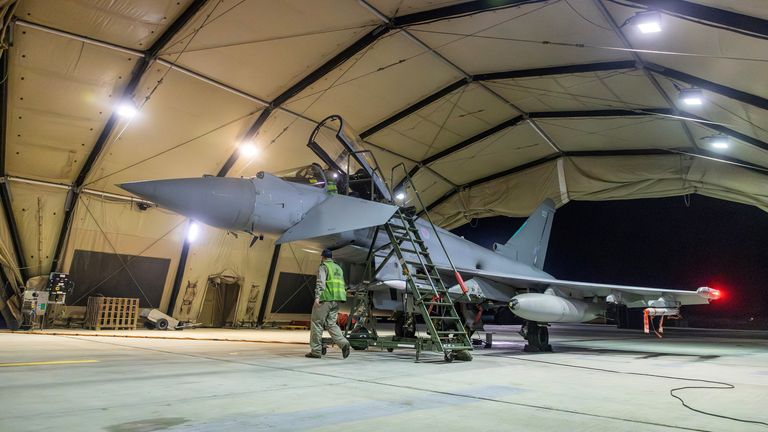A multibillion-pound programme to build the UK’s future flagship fighter jet in partnership with Japan and Italy could be at risk in a sweeping review of defence.
Luke Pollard, the armed forces minister, called the project “really important” but said it would not be right for him to prejudice the outcome of the Strategic Defence Review (SDR) by setting out in a speech which pieces of military kit are required to fight future wars.
It left open the possibility that the Global Combat Air Programme (GCAP) – a vital piece of work for British defence industry giant BAE Systems – could be vulnerable should the review decide that committing limited funds to a project that will only deliver new aircraft in the next decade is not the best way to deter a more immediate threat of war with Russia.
At the same time, though, the architects of the review will need to balance countering current threats against the importance of investing in sovereign aircraft manufacturing skills as well as the economic benefits of the GCAP programme, which already supports thousands of jobs.
The lack of a guarantee by the minister that the future of the UK-Japan-Italy warplane venture is secure came despite the project being strongly endorsed in the previous government’s “refreshed” defence review, which was published only last year.
The UK’s planned GCAP fast jet – known as Tempest – is set to be a sixth-generation stealth aircraft, equipped with advanced weapons and radars, with the ability to fly at supersonic speeds in a step up from the F-35 warplane.
A new model is needed to replace the RAF’s fleet of Typhoon jets – a crucial part of UK defences against threats posed by Russia and Iran and potentially China.
“The GCAP programme is a really important programme for us,” Mr Pollard said, answering questions at an annual conference in London on air and space power on Thursday.
He said that John Healey, the defence secretary, would be meeting his Japanese and Italian counterparts next week “to underline that”.
But the minister added: “It is not right for me to prejudge what might happen in the defence review.”
He appeared to be in favour of programmes such as GCAP that are being developed in partnership with allies.
“We need cutting-edge capabilities,” Mr Pollard said. “We need to make sure that when we are procuring systems, high-end systems…that we do it in the most cost-effective way and that is by working with our partners.”
However, the minister said the defence review is “about making those decisions differently”.
He added: “It should not be about ministers saying, ‘You could do a review but by the way I am going to tell you in speeches about this platform, that platform and this platform.'”
The comments came a day after Professor Justin Bronk, a leading expert on the Royal Air Force, raised questions about the wisdom of hugely expensive, lengthy procurement programmes like GCAP when a direct war with Russia could erupt by 2028.
He also cautioned that Ukraine is on course to lose against Moscow unless its allies can provide more weapons and ammunition.
“We need to turn things around in Ukraine but also we have to get our own defences in order in the next two to three years,” Mr Bronk told the two-day Chief of the Air Staff’s Air and Space Chiefs’ Conference.
He advised investing in the fighting strength of existing warplanes and weapons.
“Given you have two to three years, and you have to be ready by that point – if I sound a bit alarmed it is because I am – stop looking at large scale procurement programmes for the next little while,” Mr Bronk, a senior research fellow at the Royal United Services Institute, said.
“If you’ve got aircraft on order now, great, keep them in the pipeline, but other than that you don’t have time to have new orders delivered.
“Buy ammunition, buy spares, increase the size of your maintenance contracts for your key fleets.”
Turning specifically to the UK’s next generation warplane, he said GCAP only made sense if investing in sovereign capability and the British defence industry is the priority rather than ensuring the UK is ready to fight a war.
“My primary hierarchy of needs in terms of where I would be putting resource … would be that GCAP is completely impossible if there is a war in Europe in the coming five years because the global economy will completely tank, we will have to divert everything to fighting that war, and, by the way, GCAP is also impossible if the US and the Chinese go to war.”
Read more:
D-Day parachute jump scaled back over lack of RAF aircraft
UK ‘increasingly vulnerable’ to threat of missile and drone attacks
Mr Bronk highlighted how questions are similarly being raised in the United States over the future of Washington’s equivalent next generation combat aircraft programme, which is known as Next Generation Air Dominance (NGAD).
“If the US thinks NGAD is maybe unaffordable in the US Air Force programme, then I think we probably need to look very carefully at how we are going to do this in Europe.”
A Ministry of Defence spokesperson said: “GCAP is an important programme and positive progress continues with our partners, Japan and Italy… As well as cutting-edge military technology, the programme is delivering significant economic benefits across the UK.
“The Strategic Defence Review will be wide-ranging, looking at the threats Britain faces and the capabilities we need to tackle them.”
A spokesperson for BAE Systems said: “Tempest and the Global Combat Air Programme will preserve critical sovereign combat air capability and enable the UK to retain control over its own security, support important international relationships and meet future threats, whilst contributing to economic growth and prosperity.
“The programme is estimated to contribute £37bn to the UK economy before significant additional export potential through the life of the programme, providing a real opportunity for national growth.”


